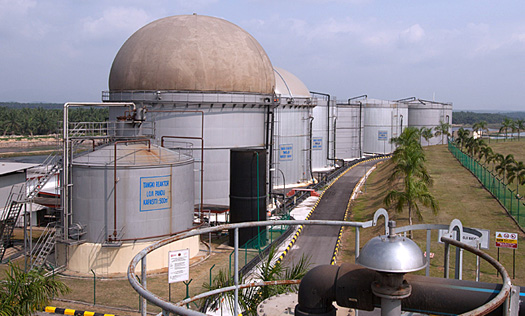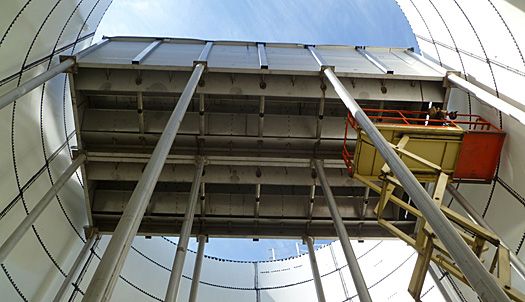Veolia-Biothane launched Pomethane anaerobic treatment for waste water palm oil industry
At the POMREQ 2012 conference for the palm oil industry Veloia's subsidairy Biothane introduced their new Pomethane technology for the anaerobic treatment of waste water from palm oil mills.
The technology has already been implemented at several Southeast Asian companies, including Felda, Malaysia's largest crude palm oil producer.
Minimum pollution, maximum biogas
The Pomthane anaerobic thermophilic digestion process includes the lastest innovations by it's developer Biothane. Methane captured from manufacturing waste materials is converted to biogas and electricity and/or steam and hot water.
In addition to increasing the diversity and security of the plant’s electricity supply, the process improves environmental performance via reduced emissions of greenhouse gases, lower risks of river and soil pollution and improved land, forest and ecosystem conservation.
Value creation: energy self-reliant mill
The launch was officially announced at the conference by Lars Hjorth, wastewater business development manager for Veolia Water Solutions & Technologies’ Southeast Asia Design & Build Projects Group. He pointed out that value creation is a key factor why anaerobic digestion processes like Pomethane have the potential to transform palm oil manufacturing practices.
Hjorth: "One obstacle to adoption of cleaner solutions to treating palm oil mill effluents has been an absence of compelling economic arguments. Pomethane enables plants to recover the energy from the effluent to power their mill production and staff quarters, with some plants able to produce enough gas to become energy self-reliant or even generate revenue through the sale of excess electricity back to the grid."
Recovery as fertilizer
Treated palm oil mill waste water and solid/fibre biomass can also be recovered for use as fertiliser in the plantation or for sale on the market. According to Veolia, it has been demonstrated as well that Pomethane can be combined with an aerobic polishing plant for a final effluent discharge of BOD < 20ppm, allowing the reuse of water for irrigation and the application of wastewater sludge as fertiliser.
At Felda’s 60-tonne Serting Hilir palm oil mill, the 1.2 MW generated per hour supplies energy to both the plant’s own production facility and the grid of the local energy provider. The treatment process yields a level of COD removal exceeding 90% and significant cuts in greenhouse gas emissions.
This news release was originally published on the website of Veolia Biothane.
More information
Biothane
Delft, the Netherlands
+31 15 270 01 11
www.biothane.com





